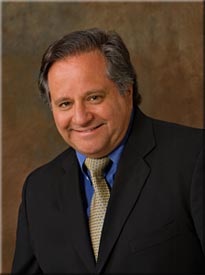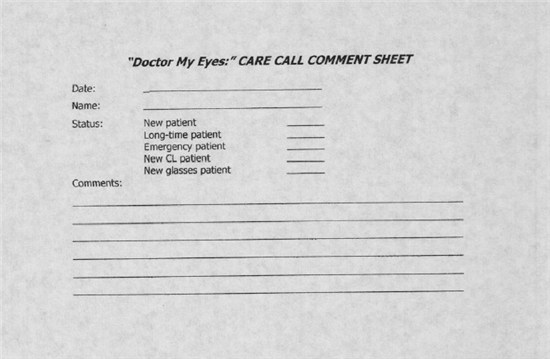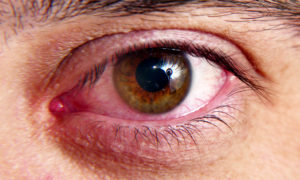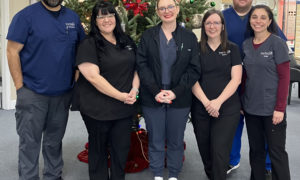By Stephen Cohen, OD

SYNOPSIS
When patients visit for a medical reason, a care call following treatment should be routine.
ACTION PLAN
PLAN A CARE CALL. Jot down information and contact information on patients for care calls.
MAKE CALLS YOURSELF. Patients need to hear personally from the doctor. Keep to 3-5 minutes.
FOLLOW-UP DISCUSSION FROM OFFICE VISIT. Ask the patient how they feel, if they are following their treatment plan and if there is anything else you can do for them.
When patients visit your office for a procedure such as punctal plugs or a medical eyecare emergency such as a scratched cornea or foreign body, consider calling later that night to see how they’re doing. I have found in my practice that patients appreciate my attention to their recovery. These calls are a practice differentiator that provides the patient with go-the-extra-mile service they may not get from corporate optometry chains or many other independent ECPs. I also call new contact lens patients and new patients to the practice to thank them for choosing us.
Making a care call creates a higher standard of care and shows that you care about the patient’s wellbeing and comfort. You raise expectations of the care an OD can provide.You are calling them just like their primary care doctor or specialist would. Someone will always be able to “out-cost” you and “out-speed” you. Keeping up with technology will impress and earn credibility, but there’s little that will earn loyalty more than showing that you care.
Remember a time that you underwent a medical procedure and then received a call from the doctor that evening to check up on you. No doubt it felt comforting and reassuring. That is what I call a “care call.” Incorporating care calls into your practice is easier than you think and takes up just a few minutes of time.

The form Dr. Cohen uses to jot down information needed for care calls. Click HERE or the above image to download a PDF of this form.
PLAN FOR THE CALL
We have care call forms (pictured and available for download on the left) on paper pads in each exam room.
If I see a patient who I want to follow-up on, I fill in the form while still in the exam room (when their contact information is readily available and it is in the forefront of my mind) and put it in my pocket. I can add to it throughout the day if other situations arise. When I get home, I empty my pocket and there’s the form with all the information I need. I call the patient, and can add notes that can then be added to their medical chart the following day.
Important note: Be sure to scan or otherwise incorporate the notes from your care call into the patient’s health record. It is important to keep a record of all contact made with patients.
Examples of care calls include calls to eyecare emergency patients (e.g., corneal abrasion), new contact lens wearers, or all new patients to thank them for choosing your office for their care. If you’re not sure how to proceed, start with emergency patients, calling them in the evening to see how they are feeling and to make sure they understand and are compliant with the treatment plan.
MAKE CALLS YOURSELF
When I speak to colleagues about care calls, they often respond that they spend all day with patients and don’t want to be kept on the phone all evening. I always assure them that will not be the case. First of all, patients are typically in shock when they get a personal call from their doctor, so you’re usually off the phone before they can think of a multitude of questions they might want to ask. Secondly, in my experience, patients are busy and they are also respectful of my time, so the calls tend to be fairly brief–no more than five minutes each. Having provided care calls for more than 25 years, I have yet to feel taken advantage of by a patient. Quite the contrary, their expressions of appreciation tend to take up as much time as the content of the call! Also, although you can designate someone in your practice to make these calls, nothing will have the same impact as a call from you, their doctor.
FOLLOW-UP TO FOREIGN BODY REMOVAL
I recently saw a new patient at the end of the day who had been out hunting, and while walking in the desert outside of Phoenix, got a cactus thorn embedded in his eye. This was removed successfully in the office. I called that night to see if the discomfort was less than before he came in, and to make sure he picked up his medication. This was on a Thursday. I kept the care call notes on my desk at home, and called him again on Saturday to see how he was doing.
He told me that he and his wife had been seeing a local ophthalmologist for a few years, but their office couldn’t take him when he was injured, and that the care he received and the concern he felt in my office convinced them that they should change doctors. They have since called to set up comprehensive exams, and said they’ve already been telling people about the “doctor who saw me on short notice, and called over the weekend just to check up.”
This story is not unique in my experience doing care calls. When you think of creating good will, and promoting your practice, how much would you value these people who have become ambassadors of your practice? It cost me nothing financially, and just a few minutes of time. I legitimately cared about this patient, and my call to him demonstrated that caring to him. In a time when patients are shocked to have a doctor even return a call, what does it say when the doctor initiates a call during non-business hours merely out of concern?
With all the advances in technology and training that aid in our patient care and provide a “wow” factor for our patients, it is sometimes the old-fashioned approach that can impact the doctor/patient relationship the most. Getting a patient to come in the first time isn’t the challenge. Rather, it’s getting them to loyally come back and refer others that has to be earned. With that in mind, there are four words that can be used as a mantra for building patient loyalty and helping to distinguish your practice: If you care, call.
Related ROB Articles
Make the Call: Build a Relationship with Patients Built on Trust
Doctor-Patient Communication Starters: Keys to Stellar Service
Getting to Know You: Take Time to Get to Know Your Patients
Stephen Cohen, OD, is the owner of Doctor My Eyes in Scottsdale, Ariz. Dr. Cohen also is a past-president of the Arizona Optometric Association (AzOA), and a recipient of the “OD of the Year” from both the AzOA, as well as the Great Western Council of Optometrists. He has lectured nationally and internationally, been frequently published and has participated in numerous FDA eyecare studies. To contact him: stephen.cohen@doctormyeyes.net.



























